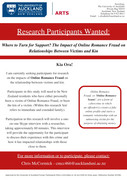Seeking New Zealanders for Romance Scam University Research
Posted: Wed Jun 27, 2018 9:04 am
by Chris UoA
Kia Ora (hello!),
My name is Chris McCormick and I am currently seeking research participants for my Masters thesis with the University of Auckland.
The aim of this research is to better understand the impact online romance fraud has on the relationships between victims and their kin.
Participants in this research will be New Zealand residents who have either been the victim of online romance fraud, or the family member of someone who has.
If this sounds like you and you would like to share your opinion on this matter, or you have any questions, please contact me at
cmcc466@aucklanduni.ac.nz .
Many thanks,
Chris

Re: Seeking New Zealanders for Romance Scam University Research
Posted: Wed Jul 25, 2018 3:44 am
by knuckles
NZ Herald
By: Carla Penman
More than 200 Kiwis have been caught out by romance scams this year, costing them $7.9 million.
That's just for the first three months of 2018 alone, according to the latest quarterly report from Netsafe, and is six times more than for the whole of last year.
Among those conned was a man in his 40s who sent $200,000 to someone he met on a dating site while a woman in her 50s lost $15,000 and was unwittingly used as a "mule" by receiving funds from another person caught up in the same scam.
Netsafe's director of technology and partnerships, Sean Lyons, said that while it was difficult to pinpoint the exact reason for the increase, it was likely because there has been an increase in scam attempts.
He said the romance scams today were a lot more sophisticated than they used to be, making them increasingly harder to spot.
"It's a lot more sophisticated. There often a lot more evolved, they [scammers] do a lot more to convince people that they are legitimate," he said.
Romance scammers were also prepared to play the long game until their victims fell in love and had no reason to believe they were being conned.
"It's sometimes years with no real attempt to defraud them, and then suddenly when somebody brings up money after that length of time, you think 'there's no way this is a scam'," Lyons said.
"When they [scammers] do finally go for what they're looking for it seems legitimate, and anyway, you're head over heels by that stage and the last thing in the world you want to do is think they're [the scammers] out to get you."
The Commission for Financial Capability's manager of fraud education, Bronwyn Groot, deals with such cases and told the Herald the new figures weren't surprising.
"We need to remember that most of those funds will have gone offshore, possibly to fund organised crime such as drugs and human trafficking," she said.

